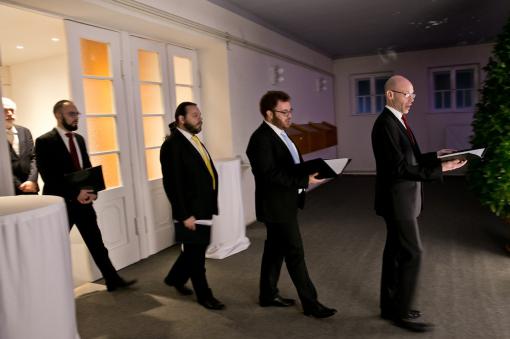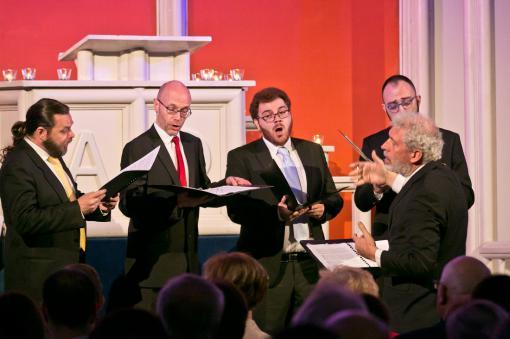In Brno’s Blahoslavův dům a concert took place drawing on the legacy of Jan Garbarek and The Hilliard Ensemble. Rather than copying the project from the nineties the ensemble Cantar Lontano and Gavino Murgia provided an authentic interpretation and it was a great success.
In 1994 the Norwegian saxophonist Jan Garbarek together with The Hilliard Ensemble recorded the album Officium, which in a bold fashion created a fusion of early renaissance vocal compositions and jazz. The demise of the ensemble three years ago led Marco Mencoboni, a harpsichordist and organist with a special passion for early music, to production of the greater part of Officium in cooperation with the ensemble Cantar Lontano and Gavino Murgia, a soprano saxophonist. Simply he was sorry that the repertoire with which he felt a strong relationship would no longer be performed live.
 The series of compositions which is a practical overview of the most influential composers in early renaissance Europe, unlike Garbarek’s model, was preceded by the Gregorian Introitus, a logical reminiscence of the traditions of the western Christian liturgy. While the quartet of singers slowly entered the main part of the hall, Murgia responded from the vestibule. The effect was one hundred per cent successful – the intonation of the ensemble was not the best at the start, nor was the overall coherence.
The series of compositions which is a practical overview of the most influential composers in early renaissance Europe, unlike Garbarek’s model, was preceded by the Gregorian Introitus, a logical reminiscence of the traditions of the western Christian liturgy. While the quartet of singers slowly entered the main part of the hall, Murgia responded from the vestibule. The effect was one hundred per cent successful – the intonation of the ensemble was not the best at the start, nor was the overall coherence.
The ensemble fluently moved onto the composition Parce Mihi Domine by Cristóbal de Morales, in which for the first time with his tonal colour the countertenor Alessandro Carmignani excelled. Murgia took care of the links between the individual compositions. His improvised entries had certain modality corresponding with the character of the vocal compositions. The seepage of jazz figures and ornamentation was however very evident. Compared to Garbarek, Murgia’s recitation was richer and with more significant dynamic twists and turns. The difference between Norwegian and Italian nature was more than evident. What’s more Murgia in several moments added guttural overtone singing, which significantly extended of the already marked link between two apparently incompatible worlds.
The relationship between the solo instruments and the vocal quartet transformed during the performance of the cycle. While at times the speech of the saxophone only sensitively commented on the ongoing song, at others Murgia entered with verve and almost free-jazz abstractedness. It was thus a constant alternation of harmony and contrasts.
In the composition Pulcherima Rosa by an unknown composer the bass Guglielmo Buonsanti performed, which however was rather an exception, because lower voices throughout the whole of the concert rather disappeared. In the Gregorian sequence Regnantem Sempiterna we again heard Murgia’s overtone singing. This primitive tribal element was a great contrast with the cultivated chorales. The concluding harmony in the amen was then undoubtedly the culmination of the first half of the evening.
In the Beata viscera of Master Perotin, the choirmaster of Notre Dame, the countertenor shone. Alessandro Carmignani in the position of the leading voice fully developed his potential, which he could not do in the quartet. His sensitive vibrato, beautiful colour and dynamic variety helped to achieve one of the most moving moments of the evening.
In Josquin’s chanson Mille regrets from the beginning solo the quartet built successful ensemble work, and furthermore the interpreters worked with the space in which they changed their positions. Evidently the best known composition of the evening was the Marian Ave, maris stella by Guillaume Dufay. In this the listeners experienced almost cacophonous moments, which alternated with a lucid chorale.
The original project, as is evident from the recording, was very much aided by the full monastery acoustic. Longer echoes are not however the case in the church space in Blahoslavův dům, this small place however in return for the shorter reverberation offers higher intensity and no tone was lost. On the other hand these are somewhat unforgiving conditions for musicians. During the concert the quartet a few times lost intonation and the creaky chairs the audience sat on did not on the whole help the overall sound. Nonetheless the interpreters did not blindly copy the project, but allowed it to breather freely and performed with unquestionable quality. This was a grade A experience.
Galakoncert for Concentus Moraviae. CANTAR LONTANO (Alessandro Carmignani – countertenor, Paolo Borgonovo – tenor, Riccardo Pisani – tenor, Guglielmo Buonsanti – bass) GAVINO MURGIA – saxophone, MARCO MENCOBONI – artistic director. Officium Divinum – Introito Gregoriano: Requiem Aeternam, Christóbal de Morales: Parce Mihi Domine, Pierre de La Rue: O Salutaris Hostia, Anonimo: Pulcherrima Rosa, Sequenza Gregoriano: Regnantem Sempiterna, Magister Perotinus: Beata Viscera, Josquin Desprez: Mille Regrets, Guillaume Dufay: Ave Maris Stella, Christóbal de Morales: Parce Mihi Domine. Tuesday 4 April 2017, Blahoslavův dům, Brno.































